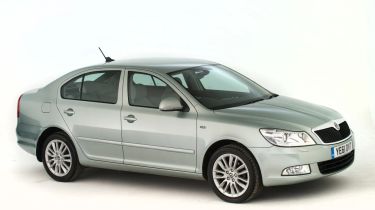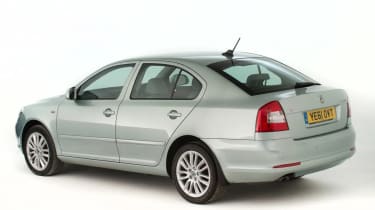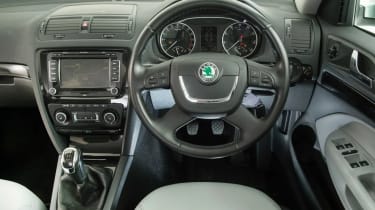Used Skoda Octavia (Mk2, 2004-2013) review
A full used buyer’s guide on the Skoda Octavia covering the Octavia Mk2 (2004-2013)
Verdict
Most used buyers don’t care about pin-sharp handling or futuristic styling. Instead, their priorities are reliability, practicality and low running costs. It’s these that the Octavia delivers so effortlessly, so it’s no wonder it’s always done so well in our annual Driver Power satisfaction survey. The Skoda can still deliver where it matters most, on practicality, value and low running costs. Popular with the police and taxi drivers alike, it’s not surprising the Octavia was crowned Best Used Estate in our recent Used Car Awards – plus the hatchback is every bit as talented.
History
The second-generation Octavia hatch arrived in July 2004; seven months later, the estate appeared, with four-wheel drive available from March 2005. The sportiest Octavia launched in December 2005 – the 2.0-litre TFSI vRS petrol hatch or estate. A 2.0 TDI vRS diesel followed in August 2006, along with the jacked-up Octavia Scout 4x4.
A facelift in January 2009 brought an overhauled cabin, new lights and a 1.4 TSI engine (replacing the 1.6 and 2.0 FSI); the Scout and vRS were refreshed four months later. The eco-friendly GreenLine 1.6 TDI made its debut in June 2009; from January 2010 there was an Octavia 1.2 TSI. Two run-out specials, the SE Connect and vRS Blackline, appeared in September 2012, before an all-new Octavia landed in March 2013.
Which one should I buy?
Pre-2009 naturally aspirated 1.4 and 1.6 FSI engines aren’t all that exciting; the new TSI motors are noticeably more punchy.
The common-rail (CR) diesels are smooth and quiet but won’t take neglect; the 1.9 TDI’s power delivery is more peaky, plus it’s a tough engine. The DSG auto box is superb, although it tends to be less reliable than the manual alternative. Entry-level cars (Classic, S) are basic, so buy a model with Ambiente trim (SE from 2009) at the very least to get climate control, alloy wheels, remote central locking and electric windows. The Elegance is even better; it comes with rear parking sensors, cruise control, automatic wipers plus an auto-dimming rear-view mirror.
Alternatives to the Skoda Octavia Mk2
Sales in this class are falling, but for now, the Octavia has lots of rivals on the used market. In most plentiful supply are fleet favourites the Ford Mondeo and Vauxhall Insignia, which are easy to recommend.
Used - available now

2020 Skoda
Octavia
20,133 milesManualDiesel2.0L
Cash £13,787
2019 Skoda
Octavia
72,753 milesAutomaticPetrol2.0L
Cash £13,087
2020 Skoda
Octavia
27,280 milesManualPetrol1.5L
Cash £11,663
2021 Skoda
Octavia
8,980 milesManualPetrol1.0L
Cash £14,700The Citroen C5 can be a bargain, but can’t match the Skoda for reliability; the same goes for the Peugeot 407, although the 508 that replaced it is much better.
The Mazda 6 is stylish, great to drive and reasonably reliable – plus it’s good value for money. Honda Accord is an unusual option, yet it’s dependable, safe, well equipped and looks smart; prices are on par with the Skoda, but the range isn’t nearly as wide.
What to look for
Radio
The DAB radio can suffer from drop-out spots and loses signal. It seems to be more of an issue on the estate because of the aerial arrangement.
Regeneration
If there’s a burning smell and the engine seems very hot when you switch off, it’s because the diesel particulate filter is being regenerated.
Leaks
Water can build up inside the front doors if the car is left to stand, and it can potentially get into the footwells as it’s channelled in via the seals.
Headlamps
The standard headlights aren’t very popular with some owners, who have fitted aftermarket H7 or H15 bulbs, usually rated at 4000-5000k.
Interior
With comfortable seats and a clear dash, the Octavia is easy to live with, but some of the materials used aren’t of an especially high quality. Head and legroom are very good, and so is the boot space. There’s 560 litres available with the seats up, or 1,350 litres with them down – but they don’t fold flat.
Running costs
All Octavias are offered with fixed or variable servicing. The latter requires maintenance up to every two years or 18,600 miles; the fixed schedule means a check-up every 10,000 miles or 12 months. Services alternate between minor and major, priced at £149 and £269 respectively.
The air-con should be recharged annually, at £75, while new brake fluid (£45) is required every two years. All engines have a cambelt that needs to be replaced every four years or between 75,000 and 130,000 miles. Expect to pay £385 to have a new belt fitted, or £485 with a new water pump at the same time.
Recalls
The second-generation Octavia has been recalled four times. First up, in February 2005, cars built from March to August 2004 with the TDI PD engine were called back over fuel leaks. The same fault led to another recall in late 2011, concerning 2.0 TDI Octavias produced from 2009.
A campaign in April 2006 affected 2.0 TDI manual cars built between February 2004 and June 2005, due to a risk of flywheel failure. Finally, in December 2009, DSG models were recalled as they could suffer from a loss of drive.
Driver Power owner satisfaction
A ranking of 70th in our Driver Power 2016 satisfaction survey is impressive for a 12-year-old car; when it was new, the Octavia was rarely out of the top five. Fourth for practicality is excellent, while 40th for running costs and 54th for build quality are good. But reliability (134th) and ride quality (120th) disappoint.










